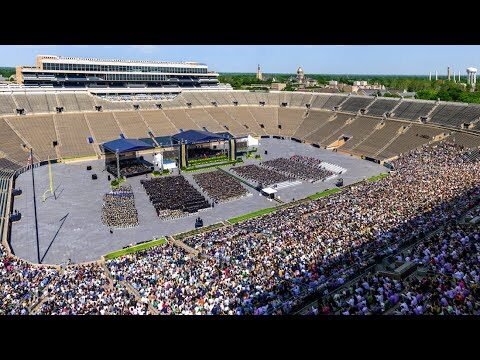Celebrating Notre Dame University Graduates: A Journey of Achievement

As the sun rises over Notre Dame University, a sense of anticipation fills the air, heralding a momentous occasion: graduation day. This cherished tradition not only celebrates the academic achievements of students but also marks the beginning of new journeys filled with potential and promise. Families gather, proud smiles abound, and the iconic Golden Dome stands tall, symbolizing the enduring spirit of this esteemed institution. As graduates don their caps and gowns, they prepare to step into a world that awaits their talent and passion, ready to make their mark beyond the hallowed halls of Notre Dame.
What traditions define Notre Dame University graduation?
Notre Dame University graduation traditions include the cap and gown ceremony, the singing of the alma mater, and the distribution of diplomas during a formal commencement ceremony.
When is the graduation day for Notre Dame?
Commencement Weekend at Notre Dame is set for May 16-18, 2025, offering a memorable celebration for graduates and their families. For the latest details, including the Schedule of Events, it is recommended to check the Commencement web pages regularly, as updates will be made available in February and March. Stay informed to ensure you don’t miss any important information leading up to this significant occasion.
Who will be speaking at the Notre Dame graduation in 2024?
The University of Notre Dame is set to celebrate its 179th Commencement Ceremony on May 19, 2024, with a distinguished speaker at the helm. President Rev. John I. Jenkins, C.S.C., will take center stage, delivering inspiring remarks to the graduating class as they embark on their next chapters.
This announcement was made by Jack Brennan, chairman of the Notre Dame Board of Trustees, highlighting the significance of this event in the university’s rich history. As graduates gather to reflect on their achievements and future aspirations, Rev. Jenkins’ address promises to resonate deeply, fostering a spirit of hope and ambition.
What is Notre Dame’s four-year graduation rate?
The University of Notre Dame boasts an impressive graduation rate, underscoring its commitment to academic excellence and student support. Recent statistics reveal that about 94% of students successfully complete their degrees within four years, while an even more remarkable 96% graduate within six years. This high level of achievement reflects the university’s dedication to fostering an environment where students can thrive and reach their educational goals.
Honoring Excellence: The Legacy of Notre Dame Graduates
The legacy of Notre Dame graduates is a testament to the enduring impact of education rooted in values and community. From leaders in business and politics to innovators in science and the arts, these alumni exemplify the spirit of excellence that defines the university. Their commitment to service and integrity not only shapes their personal and professional lives but also inspires future generations to strive for greatness. With a robust network of over 200,000 alumni worldwide, Notre Dame graduates continue to make significant contributions that resonate across various fields, proving that the foundation laid during their time at the university remains a guiding force.
As ambassadors of Notre Dame’s mission, these individuals carry forward a tradition of academic rigor and moral responsibility. Their achievements reflect a unique blend of knowledge, faith, and a relentless pursuit of improvement. Whether through philanthropy, mentorship, or leadership, they embody the university’s values, fostering a culture of excellence that transcends borders. By honoring their accomplishments, we not only celebrate their individual journeys but also reinforce the collective legacy of Notre Dame, reminding us all of the profound influence that education can have in shaping a better world.
From Dreams to Reality: A Celebration of Success
Success is often born from the seeds of dreams, nurtured by determination and hard work. Each milestone achieved is a testament to the countless hours of effort, resilience, and belief in one’s vision. As we reflect on these journeys, we celebrate not just the end results but the challenges overcome and the growth experienced along the way. This celebration serves as a reminder that every great achievement begins with the courage to dream big and the commitment to turn those dreams into reality, inspiring others to embark on their own paths toward success.
Inspiring Futures: The Impact of Notre Dame Alumni
The legacy of Notre Dame alumni extends far beyond the campus, shaping industries and communities worldwide through their commitment to excellence and service. From pioneering advancements in technology to championing social justice initiatives, these graduates exemplify the spirit of leadership and innovation instilled during their time at the university. Their diverse achievements not only inspire current students but also create a ripple effect, encouraging future generations to dream bigger and act bolder. As they continue to connect and uplift one another, Notre Dame alumni are not just making an impact; they are redefining the future for countless individuals and communities around the globe.
Together We Thrive: Commemorating Our Graduates’ Triumphs
As we gather to celebrate the remarkable achievements of our graduates, we honor not only their hard work and dedication but also the unwavering support of family, friends, and mentors who have been instrumental in their journey. Each graduate’s success story is a testament to resilience and perseverance, reflecting the collective spirit that drives us forward. Together, we have navigated challenges and celebrated milestones, creating a vibrant community that fosters growth and innovation. Today, we stand united in pride and joy, ready to embrace the future and the endless possibilities that await our talented graduates.
The Notre Dame University graduation is not just a ceremony; it’s a celebration of resilience, achievement, and the lifelong bonds forged within its hallowed halls. As graduates step into a world brimming with possibilities, they carry with them the values and lessons instilled during their time at Notre Dame. This moment marks the beginning of new journeys, inspiring them to make meaningful contributions to society and embody the spirit of excellence that defines this esteemed institution.



